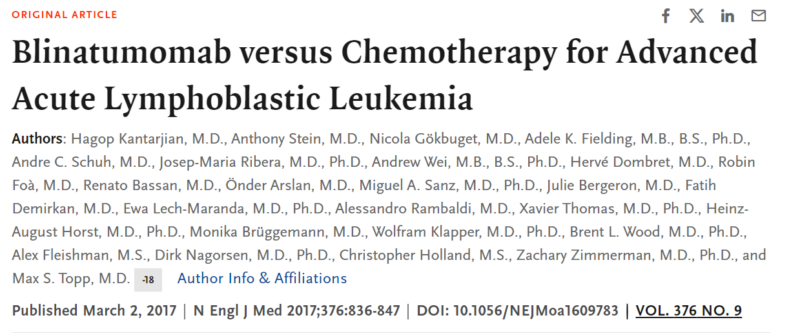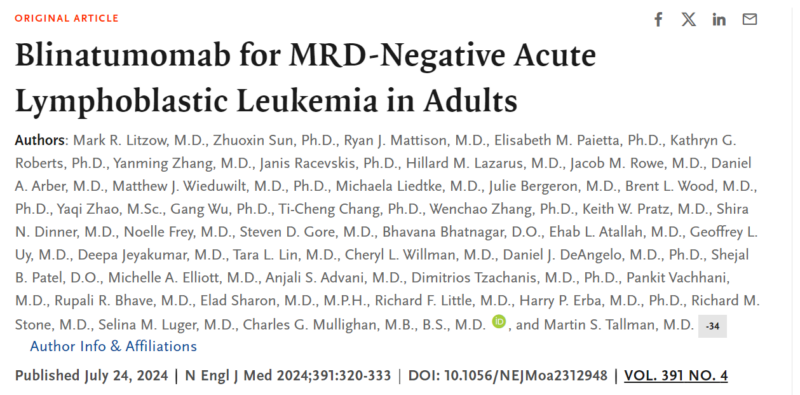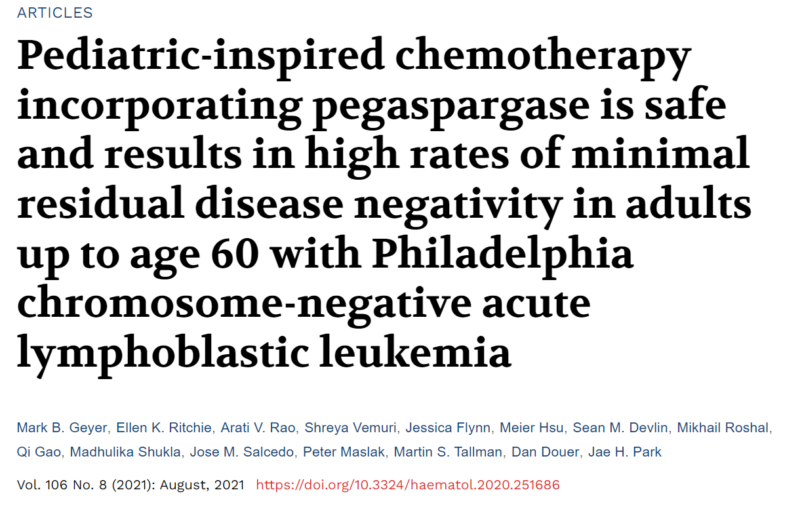
Krishna Komanduri: An incredibly important leukemia trial
Krishna Komanduri, Physician in Chief at UCSF Helen Diller Family Comprehensive Cancer Center, shared a post by Mark Geyer, Assistant Attending Physician at Memorial Sloan Kettering Cancer Center, on X, adding:
“An incredibly important leukemia trial and a lovely flourish in an impactful and altruistic career by our dear colleague Mark Litzow.”
Quoting Mark Geyer‘s post:
“A few days late, but wanted to post about the practice-changing ECOG 1910 trial led by my colleague Mark Litzow. The bispecific T-cell engager (BiTE) blinatumomab (blina) comprises two scFVs directed to CD3 (on T-cells) and CD19 (on malignant and non-malignant B-cells). Blina was first approved for relapsed/refractory B-ALL based on the randomized TOWER trial.
Blinatumomab versus Chemotherapy for Advanced Acute Lymphoblastic Leukemia
Autors: Hagop Kantarjian, Anthony Stein, Nicola Gökbuget, Adele K. Fielding, Andre C. Schuh, Josep-Maria Ribera, Andrew Wei, Hervé Dombret, Robin Foà, Renato Bassan, Önder Arslan, Miguel A. Sanz, Julie Bergeron, Fatih Demirkan, Ewa Lech-Maranda, Alessandro Rambaldi, Xavier Thomas, Heinz-August Horst, Monika Brüggemann, Wolfram Klapper, Brent L. Wood, Alex Fleishman, Dirk Nagorsen, Christopher Holland, Zachary Zimmerman, and Max S. Topp,

Subgroup analysis from that study suggested better rates of response and OS in patients with lower-burden (vs higher burden) ALL.
Subsequently, results from the BLAST trial in patients with 0.1%-<5% B-ALL after 3 courses of intensive chemotherapy supported efficacy in clearing measurable residual disease (MRD), with some long-term responses even seen without subsequent allogeneic transplant, further supporting the role of blina in patients with low-volume disease.
So blinatumomab is effective for patients with frank R/R B-ALL and those who are MRD+. But what about MRD-negative? ECOG 1910 was a randomized trial of patients age 30-70 with BCR::ABL1-negative B-ALL and primary analysis ultimately focused on patients who were MRD negative after induction 1/2 and intensification, randomized to chemotherapy alone vs chemotherapy + blinatumomab.
Litzow et al. have now demonstrated an OVERALL SURVIVAL benefit in pts with B-ALL achieving MRD negativity who received blinatumomab in CR1 (85% vs 68% OS at 3y, 80% vs 64% RFS at 3y). The chemotherapy backbone of E1910 is less-than-attractive to some (including me) but the 16-17% advantage in RFS/OS is striking and practice-changing.
Blinatumomab for MRD-Negative Acute Lymphoblastic Leukemia in Adults
Auotors: Mark R. Litzow, Zhuoxin Sun, Ryan J. Mattison, Elisabeth M. Paietta, Kathryn G. Roberts, Yanming Zhang, Janis Racevskis, Hillard M. Lazarus, Jacob M. Rowe, Daniel A. Arber, Matthew J. Wieduwilt, Michaela Liedtke, Julie Bergeron, Brent L. Wood, Yaqi Zhao, Gang Wu, Ti-Cheng Chang, Wenchao Zhang, Keith W. Pratz, Shira N. Dinner, Noelle Frey, Steven D. Gore, Bhavana Bhatnagar, Ehab L. Atallah, Geoffrey L. Uy, Deepa Jeyakumar, Tara L. Lin, Cheryl L. Willman, Daniel J. DeAngelo, Shejal B. Patel, Michelle A. Elliott, Anjali S. Advani, Dimitrios Tzachanis, Pankit Vachhani, Rupali R. Bhave, Elad Sharon, Richard F. Little, Harry P. Erba, Richard M. Stone, Selina M. Luger, Charles G. Mullighan

How should we incorporate blina into pediatric regimens such as CALGB 10403 and pediatric inspired regimens ? Can we remove blocks of intensive chemo? And what about SC blina to spare the need for a central line? This still needs to be addressed (and hopefully will be soon), but for now, congrats to the E1910 team for conclusively showing benefits of blina even in sub-MRD-level disease!”
Pediatric-inspired chemotherapy incorporating pegaspargase is safe and results in high rates of minimal residual disease negativity in adults up to age 60 with Philadelphia chromosome-negative acute lymphoblastic leukemia
Autors: Mark B. Geyer, Ellen K. Ritchie, Arati V. Rao, Shreya Vemuri, Jessica Flynn, Meier Hsu, Sean M. Devlin, Mikhail Roshal, Qi Gao, Madhulika Shukla, Jose M. Salcedo, Peter Maslak, Martin S. Tallman, Dan Douer, Jae H. Park

Source: Krishna Komanduri/X and Geyer/X

